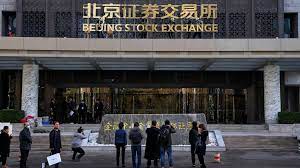In the midst of a crackdown on internet titans that has wiped more than $1 trillion off their market value abroad; a stock exchange set up in the Chinese capital to assist entrepreneurs commenced trading Monday with 81 companies.
The Beijing Stock Exchange joins the Shanghai Stock Exchange and the Shenzhen Stock Exchange in mainland China. They are generally closed to foreign investors; however certain companies’ shares are traded in Hong Kong, a separate Chinese colony open to international finance.
The Communist Party, which is in power, has promised increased backing for entrepreneurs who create money and jobs while tightening control over technology corporations. They are being pushed to put their own money into Beijing’s industrial objectives.
In September, President Xi Jinping stated the Beijing exchange will “establish a service-innovation-oriented core position for small and medium-sized enterprises,” as the ruling party’s euphemism for private businesses.
Chinese stock exchanges were established to attract funds for state-owned enterprises, prompting entrepreneurs to seek funding from outside.
After the ruling party tightened control over tech companies by initiating data security and other crackdowns last year, investors are concerned about the position of China’s entrepreneurs. On Wall Street and in Hong Kong, investors have slashed the value of Tencent Holding and other tech behemoths by more than $1 trillion.
According to state media, the Beijing exchange will accommodate smaller enterprises and bigger price swings than Shanghai or Shenzhen.
Prices will be allowed to fluctuate by a daily limit of 30% after their first day before trading is banned. The big bourses in Shanghai and Shenzhen are 10% one way or the other, while their high-tech and small company boards are 20% one way or the other.
Henan Tongxin Transmission Co., a manufacturer of industrial parts, rose by well over 500 percent on its first day on the market on Monday. The majority of other firms, many of which were transferred from other exchanges, climbed or declined by single-digit percentages.
The Beijing Stock Exchange is yet to announce an index that will reflect the market’s overall movement. The name could be a problem because BSE is already used for India’s main exchange and indexes.
In 2004, Shenzhen established a separate trading board for private businesses. In 2019, Shanghai established a board for technology businesses.

















